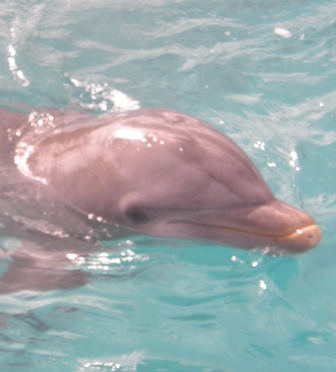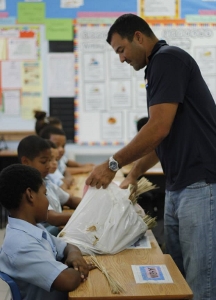Archive for May 22nd, 2014

No offers from employers to take ex CS workers
 (CNS Business): Although the review of the public service could trigger significant cuts in the government headcount, Deputy Governor Franz Manderson has said that so far none of the islands’ larger employers have come forward with any kind of offer to take on local workers that could become casualties in the downsizing. The president of the Chamber of Commerce, Johann Moxam, has stated publicly that the private sector needs to step up and support government by taking on Caymanians, which Premier Alden McLaughlin said was very helpful. But Manderson said no employers or business leader have made any kind of offer to assist or commitment in the transition of public sector workers into the private sector. Read more on CNS Business
(CNS Business): Although the review of the public service could trigger significant cuts in the government headcount, Deputy Governor Franz Manderson has said that so far none of the islands’ larger employers have come forward with any kind of offer to take on local workers that could become casualties in the downsizing. The president of the Chamber of Commerce, Johann Moxam, has stated publicly that the private sector needs to step up and support government by taking on Caymanians, which Premier Alden McLaughlin said was very helpful. But Manderson said no employers or business leader have made any kind of offer to assist or commitment in the transition of public sector workers into the private sector. Read more on CNS Business

Cops plan to pursue more ‘cold case’ murders
(CNS): Following the successful prosecution on Monday of Chad Anglin for the murder of Fredrick Bise in February 2008, the RCIPS has said its Cold Case Unit will continue to “investigate and pursue rigorously all leads in order to solve our cold case homicides". Police have said that no unsolved murders are formally closed on their books and detectives will continue working on cold cases, irrespective of the cost or time, until those responsible for the killings are brought before the courts. Anglin was charged with Bise’s murder last year but a file had already been sent to the legal department in 2008 by detectives working the case at the time. However, the crown prosecutors had said there was not enough evidence to try the case and ordered further enquiries.
During the latter part of 2010, the RCIPS formed the Cold Case Unit (CCU) to review unsolved homicides and the first case they turned their attention to was a review of the Bise homicide. The detectives re-interviewed witnesses and pursued other lines of inquiry before another file was submitted to what is now the Director of Public Prosecution’s office (DPP), which this time recommended that Chad Anglin and another man could be charged with murder.
Anglin was then charged at HMP Northward, where he was already serving a five year sentence in connection with a violent attack on a West Bay woman in October last year. Another man who was also charged with the murder of Bise is expected to be tried later this year.
Bise’s body was found on the morning of 8 February 2008 in the back of his burned out SUV by fire crews who had been called out to the blaze in the Mount Pleasant area of West Bay. Bise’s body was wrapped in a blanket and the autopsy revealed that death was caused by severe blunt force trauma to his head and face and strangulation.
Anyone who may have information, no matter how small, that could assist the CCU with their investigations into old murder cases is asked to call Detective Inspector Dennis Walkington at 325-8161, or to remain anonymous to call Crime Stoppers 800-8477(TIPS).

Captive dolphin breaks visitor’s teeth in pool
 (CNS): Management at one of Cayman’s dolphinairiums has denied any aggression on the part of their dolphins. Following reports that a tourist was hit in the mouth by a dolphin during a visit to Dolphin Discovery, the owner, Gene Thompson, said it was an accident which happened when the visitor lost focus for a moment. He told CNS that the visitor attended for emergency dental treatment as a result of the encounter but there were no serious injuries sustained. He also denied other reports of aggression by the dolphins held at the facility and said there had been less than a half dozen incidents since Dolphin Discovery opened where people and dolphins had clashed.
(CNS): Management at one of Cayman’s dolphinairiums has denied any aggression on the part of their dolphins. Following reports that a tourist was hit in the mouth by a dolphin during a visit to Dolphin Discovery, the owner, Gene Thompson, said it was an accident which happened when the visitor lost focus for a moment. He told CNS that the visitor attended for emergency dental treatment as a result of the encounter but there were no serious injuries sustained. He also denied other reports of aggression by the dolphins held at the facility and said there had been less than a half dozen incidents since Dolphin Discovery opened where people and dolphins had clashed.
Thompson told CNS that on rare occasions when people are swimming with the dolphins, which are big creatures, they stop paying attention or don’t let go of bait when feeding them. In such rare case, he said, there can be nips and bumps but he said the animals were all well trained and cared for and there were absolutely no cases recorded at the facility where dolphins had behaved aggressively in any way.
In this latest incident, which happened on the 7 May with a guest who was staying at the Westin and was reportedly visiting on a conference with her employer, Thompson said the visitor had lost focused for a moment while in the pool. It seemed the dolphin had butted the woman in the face, damaging two of her teeth. He said Dolphin Discovery ensured that she was treated immediately and was covering the dental work costs and has followed up with the guest.
CNS contacted the Department of Agriculture, which is charged with the responsibility of overseeing the conditions of the dolphins, but it is not clear whether the government agency keeps any record of incidents involving potential aggressive behaviour. Experts say that aggression among dolphins in captive facilities could be an indication of problems in the way the animals are being kept. A spokesperson for the DoA said that they were unaware of this incident and CNS is awaiting a response to questions regarding the DoA’s record keeping and responsibilities in connection with incidents at the dolphinariums.
The owners of Dolphin Cove, the second facility in West Bay, told CNS that they have not had a single incident at that facility where a visitor has been nipped, bumped or caused even the slightest injury by any of the dolphins. Neil Burrows said he believed the dolphin facilities were obligated to report any such incidents involving visitors and dolphins to the DoA as such behaviour is a signal of aggression and can be a warning sign that something was not right.

Public urged to help ESO with household data update
 (CNS): The Economics and Statistics Office is asking the public to co-operate with its staff who will be going door to door over the next few months to update the Cayman Islands Household Register. The survey will begin on Monday May 26 and run for three months until 29 August. This is the first time since the 2010 Census that a full update of households will be conducted. Trained enumerators will visit every dwelling unit listed in the Census register, as well as newly constructed residential homes that are not already listed, to determine if they are occupied. Marco Archer, the minister of finance for economic development explained why the data is needed.
(CNS): The Economics and Statistics Office is asking the public to co-operate with its staff who will be going door to door over the next few months to update the Cayman Islands Household Register. The survey will begin on Monday May 26 and run for three months until 29 August. This is the first time since the 2010 Census that a full update of households will be conducted. Trained enumerators will visit every dwelling unit listed in the Census register, as well as newly constructed residential homes that are not already listed, to determine if they are occupied. Marco Archer, the minister of finance for economic development explained why the data is needed.
“It is important for policy makers to be informed from household statistics,” he said. “I am urging the public to cooperate with this statistical activity which will be the basis for selecting households for future surveys such as the labour force surveys.”
ESO officials said they will also be upgrading its data collection process through the use of tablets this time around as they asked for the continues cooperation from the community
“We thank them anew in advance for their support this year,”said ESO Director Maria Zingapan.
She added that ESO staff members will be carrying identification and she advised concerned community members to always ask for the field workers to present their IDs before providing key information.

First year of school heritage course heralded a success
 (CNS): Around 500 students in year six at government-run primary schools took part in a Heritage Arts Programme this year learning for the first time in school about Cayman’s marine heritage, silver thatch plaiting, Caymanian culinary arts traditional games and much more specific local history and culture. The final Heritage Arts tests were last week on the programme which is now completing its first full school year which the creator has heralded as a success. “It’s been a really successful year for us,” Chris Christian, the programme director said. “We’ve managed to cover a tremendous amount of ground, enhancing young people’s knowledge of Cayman’s rich and vibrant arts, culture and heritage through a variety of different means.”
(CNS): Around 500 students in year six at government-run primary schools took part in a Heritage Arts Programme this year learning for the first time in school about Cayman’s marine heritage, silver thatch plaiting, Caymanian culinary arts traditional games and much more specific local history and culture. The final Heritage Arts tests were last week on the programme which is now completing its first full school year which the creator has heralded as a success. “It’s been a really successful year for us,” Chris Christian, the programme director said. “We’ve managed to cover a tremendous amount of ground, enhancing young people’s knowledge of Cayman’s rich and vibrant arts, culture and heritage through a variety of different means.”
As well as the workbook, which he said had been a mine of information for both students and teachers the programme has included showcased artwork at The Ritz-Carlton, family fun days, mentoring of young students and o teacher’s workshops, helping educators themselves learn more about Caymanian culture.
Christian explained that the programme was specifically devised to teach Caymanian heritage in a contemporary setting, ensuring the contents of each lesson have been as interactive and relevant as possible. Lessons have also been designed to draw in other elements of the curriculum.
“When we teach the culinary arts we give the students the ingredients necessary to make whatever recipe it is we are studying so they can go home and make the dish with their family,” he advised. “Our workbook has the best recipe for cassava cake on the island,” he boasted.
Kite building, a favourite Caymanian pastime, involves looking at the engineering elements that go into making a kite fly, such as assessing its weight distribution and the length of its tail, Christian said.
The programme is supported by three separate government ministries, the Ministry of Education, Employment and Gender Affairs, the Ministry of Administration, Tourism and Transport and the Ministry of Health, Sports and Youth and Culture. Tara Rivers, the education minister described the programme, as an exciting and useful addition to the school curriculum.
“The Heritage Arts Programme offers an important opportunity for young people to learn about and experience our traditional Caymanian heritage and culture through arts and crafts. It’s essential that we continue to offer such educational programmes in an effort to preserve and promote an understanding and appreciation of our cultural heritage for future generations,” she said.
For more information please visit https://www.facebook.com/pages/CTA-Cayman-Traditional-Arts/145070528867373

Numeracy focus in schools
 (CNS): Improving the standard of mathematics throughout government schools is a long slow process and entails a complete shift in the way that the subject is taught so that students connect maths to real life situations, according to the Education Ministry’s numeracy specialist, Frank Eade. The first step in tackling a recognized problem across the whole system is to re-train the teachers to teach maths in a less prescriptive way and to focus on visualization methods so that children get a real concept of numbers instead of seeing them as just marks on a page. This ongoing effort has already resulted in dramatic improvements in the primary students’ attainment levels since 2011, with a clear drop in the percentage of students in the lower attainment levels and a corresponding rise in students reaching the upper levels.
(CNS): Improving the standard of mathematics throughout government schools is a long slow process and entails a complete shift in the way that the subject is taught so that students connect maths to real life situations, according to the Education Ministry’s numeracy specialist, Frank Eade. The first step in tackling a recognized problem across the whole system is to re-train the teachers to teach maths in a less prescriptive way and to focus on visualization methods so that children get a real concept of numbers instead of seeing them as just marks on a page. This ongoing effort has already resulted in dramatic improvements in the primary students’ attainment levels since 2011, with a clear drop in the percentage of students in the lower attainment levels and a corresponding rise in students reaching the upper levels.
Student results in the public domain are widely misunderstood, Eade told CNS. The Cayman Islands has adopted the UK assessment process of attainment levels – though not, he stressed, the method of teaching. There are 8 levels and the target is for at least 50% of students to reach Level 4 by the end of Year 6. While everyone would like all children to be reaching Level 4 or above by that stage, that is not a reasonable expected result in any country, he explained.
Eade said that when he arrived two and half years ago in 2011 the percentage of students at Key Stage 2 (end of Year 6) who were at Level 2 or below in maths was 23%. In 2013, this had dropped to 13%. Correspondingly, the percentage of students at Level 4 or above has increased from 25% in 2011 to 40% just two years later in 2013.
In the UK around 80% of the children are – on paper – reaching Level 4 in maths by the end of primary school, but Eade said that the immense pressure on schools and teachers in Britain to improve statistics had warped the results, which have been achieved through a ‘production line’ mentality.
“In the UK Year 6 has become a revision factory,” he said. “The results are a bit of an illusion and no longer a true reflection of the students’ attainment levels.” Many secondary schools in the UK no longer use the assessment levels to gauge new Year 7 students’ abilities and give them CAT tests instead, he explained. “When you look at the international tables, which focus on problem solving, England has not improved at all in the last 10 or 15 years. So we have to be careful about how we look at the data.”
Countries that do very well on international tables, such as Singapore and Japan, teach maths in a very similar way to the methods now being introduced in Cayman schools.
The Cayman Islands Ministry of Education’s goal, he said, is to avoid the false results of the UK and to achieve real improvements in maths that will enable students to continue to implement what they have learned beyond school, in their lives and in their jobs, and for somethough higher learning. Not gaining a firm grasp of maths at primary level can later become an impediment for even the more academic students who go on to study such subjects as engineering, science, finance and economics, as well as mathematics itself, at university.
“Mathematics is rather peculiar subject. What you want students to do is tobe able to solve problems that are mathematical but also about the world around them, but it is often taught in a very prescriptive way and the children end up not being comfortable with it and not being good problem solvers,” Eade explained. “Not being able to use mathematics to solve problems in everyday situations is because of the way mathematics is taught. Generally, in most countries, it is a set of rules handed down by the teacher and the children are taught to go through the motions without really thinking about it all.”
To illustrate, he gave a typical fraction problem: three sandwiches to divide between four children. Students who have not been taught effectively will not immediately work out that each child will get three quarters of a sandwich each.
“What they may do instead is to cut two of them in half, so each child now has half a sandwich, then cut the last one into four. So then they each have a half plus a quarter. But they may still not realise that they each have three quarters of a sandwich. Other kids may cut each sandwich into four and then work out that they each have one quarter from each of the three sandwiches.
“But my concern as the teacher is that they haven't used their knowledge of fractions at all, so the knowledge of mathematics has not been transferred to a real situation. They're not looking at those sandwiches and saying that's 3÷4, which is three quarters. It's a disconnect between what they are learning and how to apply it,” he said.
“When I started teaching, I was shocked because I would teach the children mathematics but they could not apply it into word problems. It was as if it was two completely different worlds – and that's the big issue for teachers: how to connect these two worlds.”
Eade explained that he has implemented a ‘Leaders in Primary Maths’ program, where each school has either one or two teachers that he has trained in mathematics education, to understand the mathematics curriculum and how to teach it in the primary school. Those maths leaders are now supporting other teachers in their schools and working with them in the classroom. Eade has also created units in each year group across the system.
“Primary school teachers are generalists, not specialists, and they are quite often teaching a curriculum that they don't fully understand,” he said. Before these initiatives were implemented, some teachers lacked confidence in the mathematics they taught, but this is changing, he stressed.
The primary focus for the last two years has been Years 1 through Year 6 and there is now a far greater emphasis on visualization in the teaching of maths. An example of this is the numbers on dice.
“People naturally recognise them as groups of numbers instead of counting each dot. In the primary schools, when I show kids two groups of five like the numbers on the dice, I want them to know that is 10 and not have to count 1, 2, 3 … up to 10. If I show a student a number line, 1 up to 100, and ask them where 50 is, I want them to know that is in the middle rather than count up to 50, which is what was happening.”
For the students that need particular help, 42 teachers so far, including five from the secondary system, have been given a 10-day training course to do remedial work in a ‘Maths Recovery’ programme, which is largely sponsored by the Cayman Islands Society of Professional Accountants (CISPA).
“It's much easier if the child is taught properly from the word go, but it is possibleto catch up. However, the older they are the harder it is, and that's why catching problems early is important,” Eade noted.
“My experience is that the teachers here work very hard and it is not helpful to blame them; it's just the way that they were taught to teach,” he said, noting that the teachers have been very receptive to the changes he is making. One thing they have to learn to do, Eade said, is to hold back and get the students to talk through what they are doing.
For the next generation of educators, Eade and two other teachers from the Cayman system are lecturing at the University College of the Cayman Islands as part of its teacher training course.
“The problems are not going to change overnight,” he said. “When I arrived, I explained that this was going to be a very long term project. There is a general agreement that there needs to be some continuity and that what is happening is the right thing. It’s important that the process does not keep getting de-railed,” Eade said. “There are still problems but it is getting better.”

Dart booze plan brews concern with local producers
(CNS Business): Cayman’s only distillery, which produces niche local liquor products, is not the only local voice raising concerns about Dart’s plans to open a distillery at its Cayman Distributor’s warehouse in George Town. The local brewery has also added its concerns about the islands' largest investor and biggest corporate entity entering the production market as they fear Dart has the power to push everyone else from the liquor market. The Cayman Spirits Company said they were worried that allowing Dart to add a distillery to its list of significant booze interest would undermine rather than fuel competition and the Cayman Islands Brewery said it feared that it would push the new specialist distillery out of business. Read more on CNS business